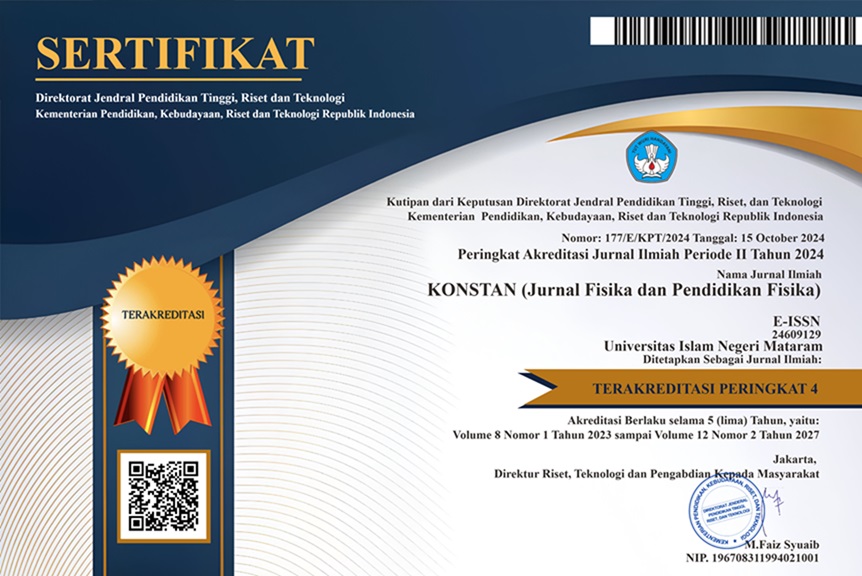The Effect of Discovery Learning Model Assisted by Vee Map on Inference Skills and Learning Outcomes Alternating Current Subject Matter
Abstract
The discovery learning model, combined with the Vee map learning approach, has been found to be suboptimal in previous studies for enhancing inference skills and physics learning outcomes. This research is needed to investigate the effect of the discovery learning model, assisted by Vee Map, on the inference skills and physics learning outcomes of high school students in the context of alternating current material. Employing an experimental method with a posttest-only control group design, the study randomly selected a sample, assuming a homogeneous population. The population for this study was drawn from SMA Negeri Ambulu's Class XII. The sample was chosen randomly (cluster random sampling) under the premise of demographic homogeneity, yielding two classes: XII Science and Technology 1 as the experimental class and XII Science and Technology 2 as the control class. Data were gathered through posttests of inference skills and physics learning outcomes in experimental and control classes using alternating current material. Independent sample t-tests revealed a significant effect: inference skills showed a significance of 0.006 < 0.05, and physics learning outcomes had a significance of 0.000 < 0.05. These results validate the alternative hypothesis (H????), confirming a notable difference in students' inference skills between the control and experimental groups, and refute the null hypothesis (H0), which posited no significant difference. Consequently, this study concludes that the discovery learning model, as facilitated by the Vee Map, improves high school students' inference skills and physics learning outcomes in the subject of alternating current.
Downloads
References
[2] R. H. Mardhiyah, S. N. F. Aldriani, F. Chitta, and M. R. Zulfikar, “Pentingnya Keterampilan Belajar di Abad 21 sebagai Tuntutan dalam Pengembangan Sumber Daya Manusia,” Lect. J. Pendidik., vol. 12, no. 1, pp. 29–40, 2021, doi: 10.31849/lectura.v12i1.5813.
[3] S. Laeni, Z. Zulkarnaen, and S. Efwinda, “Model Discovery Learning terhadap Kemampuan Berpikir Kritis Siswa SMA Negeri 13 Samarinda Materi Impuls dan Momentum,” J. Literasi Pendidik. Fis., vol. 3, no. 2, pp. 105–115, 2022, doi: 10.30872/jlpf.v3i2.935.
[4] Naijma, F. Nur, and M. S. Ikbal, “Pengaruh Penggunaan Model Discovery Learning Terhadap Kemampuan Berpikir Kritis Fisika Pada Materi Fluida Statis Kelas Xi Sman 13 Pangkep,” Konf. Nas. Pendidik. Fis., pp. 143–154, 2024.
[5] S. Lutfiana, A. Fauzi, and D. Wahyuningsih, “Remediasi Pembelajaran Fisika dengan Model Pembelajaran VAK (Visualization, Auditory, and Kinesthetic) untuk Meningkatkan Kemampuan Kognitif Siswa pada Materi Rangkaian Arus Bolak-Balik di SMA Negeri 1 Surakarta,” J. Mater. dan Pembelajaran Fis., vol. 11, no. 1, p. 43, 2021, doi: 10.20961/jmpf.v11i1.47829.
[6] I. P. Alik, D. D. Paramata, and Supartin, “Analisis Kepraktisan Perangkat Pembelajaran Model Discovery Learning Berbantuan Media Ispring Suite pada Materi Fluida Statis,” J. Pendidik. MIPA, vol. 13, no. 1, pp. 812–817, 2023, doi: https://doi.org/10.37630/jpm.v13i1.821 Analisis.
[7] R. Zahro and F. N. Pertiwi, “Analisis Komparasi Ketrampilan Inferensi Peserta Didik Ditinjau dari Penerapan Model Pembelajaran Problem Solving dengan Pendekatan Saintifik pada Pembelajaran IPA,” J. Tadris IPA Indones., vol. 1, no. 1, pp. 23–33, 2021, [Online]. Available: https://doi.org/10.21154/jtii.v1i1.67%0Ahttps://ejournal.iainponorogo.ac.id/index.php/jtii/article/view/67.
[8] R. Wijayanti and J. Siswanto, “Profil Kemampuan Berpikir Kritis Siswa SMA pada Materi Sumber-sumber Energi,” J. Penelit. Pembelajaran Fis., vol. 11, no. 1, pp. 109–113, 2020, doi: 10.26877/jp2f.v11i1.5533.
[9] D. S. F. Arif, Zaenuri, and A. N. Cahyono, “Analisis Kemampuan Berpikir Kritis Matematis Pada Model Problem Based Learning ( PBL ) Berbantu Media Pembelajaran Interaktif dan Google Classroom,” Pros. Semin. Nas. Pascasarj. UNNES, no. 2018, pp. 323–328, 2019.
[10] M. Aprilia, P. H. M. Lubis, and L. Lia, “Pengaruh Model Discovery Learning Terhadap Pemahaman Konsep Siswa SMA Berbantuan Software Tracker pada Materi GHS,” J. Pendidik. Fis. dan Teknol., vol. 6, no. 2, pp. 320–326, 2020, doi: 10.29303/jpft.v6i2.2286.




.png)
